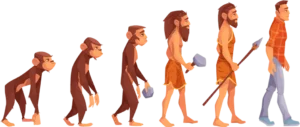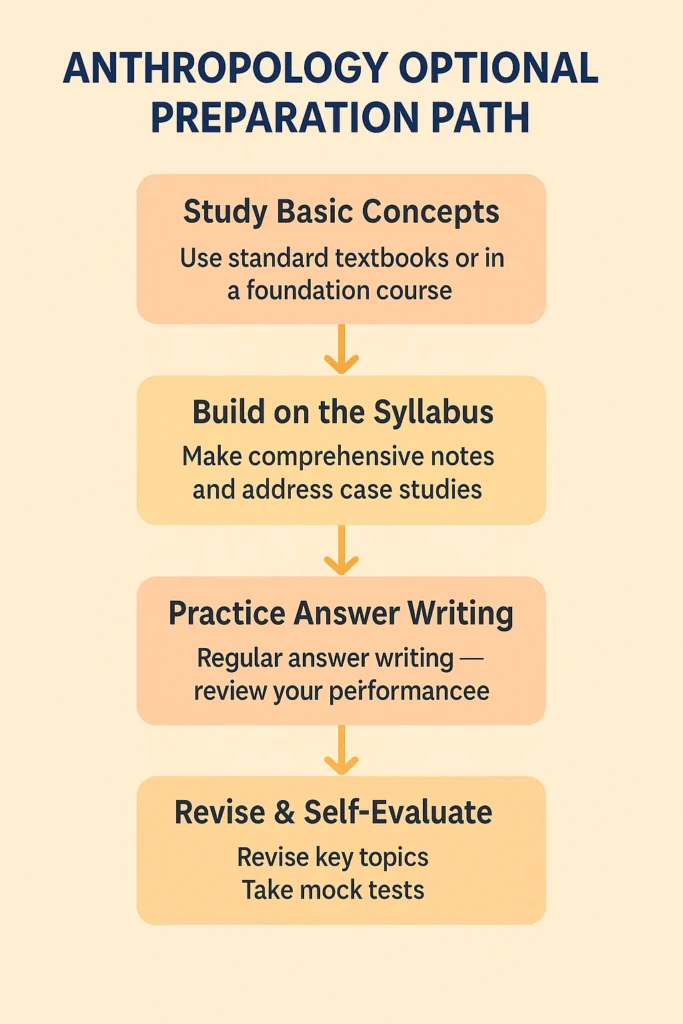+91-7303290503, +91-9557169661 | MON to SUN 10:00 AM - 6:00 PM
Why choose Anthropology Optional for UPSC?

Anthropology is one of the most popular optional subjects in UPSC due to its well-defined syllabus, scientific approach, and high scoring potential. With strong conceptual clarity, it becomes easy to write structured answers, incorporate diagrams, and score well in Mains. Many toppers have chosen Anthropology as their optional, and it has consistently delivered good success rates.
It is especially suitable for:
- Beginners and non-science backgrounds (the subject starts from basics)
- Aspirants aiming for good overlap with GS Paper I (Society & Culture) and Essay Paper
- Candidates who prefer concise syllabus compared to bulky optionals like PSIR or History
Success Rate (UPSC Data):
- Approx. 7–10% success rate — one of the highest among popular optionals.
Overlap with GS & Essay:
- GS Paper I: Society, culture, diversity of India
- GS Paper II & III: Tribal issues, governance, environment, ethics
- Essay Paper: Themes on human development, society, ethics
Scoring Potential:
- Use of diagrams, flowcharts, case studies, and current examples makes answers rich and impactful.
- Direct questions from static syllabus + value addition = high returns.

Anthropology Optional Syllabus
Mastering the Anthropology Optional starts with knowing the syllabus inside out.
UPSC Anthropology Optional syllabus is well-structured, covering everything from the fundamentals of socio-cultural and biological anthropology to archaeological insights, tribal issues, human evolution, genetics, and contemporary socio-economic challenges of Indian communities. Paper I focuses on core theories, thinkers, and global anthropological perspectives, while Paper II dives deep into Indian Anthropology — exploring tribal diversity, customs, issues of development, and applied anthropology.
A clear understanding of the syllabus helps in smart topic prioritisation, focused reading, and efficient answer writing practice. Get your complete, well-organised syllabus now and start building your preparation roadmap!
Anthropology Optional Paper 1 Syllabus
1.1 Meaning, Scope and development of Anthropology.
1.2 Relationships with other disciplines: Social Sciences, behavioural Sciences, Life Sciences, Medical Sciences, Earth Sciences and Humanities.
1.3 Main branches of Anthropology, their scope and relevance:
(a) Social-cultural Anthropology.
(b) Biological Anthropology.
(c) Archaeological Anthropology.
(d) Linguistic Anthropology.
1.4 Human Evolution and emergence of Man:
(a) Biological and Cultural factors in human evolution.
(b) Theories of Organic Evolution (Pre-Darwinian, Darwinian and Post-Darwinian).
(c) Synthetic theory of evolution; Brief outline of terms and concepts of evolutionary biology (Doll’s rule, Cope’s rule, Gause’s rule, parallelism, convergence, adaptive radiation, and mosaic
evolution).
1.5 Characteristics of Primates; Evolutionary Trend and Primate Taxonomy; Primate Adaptations; (Arboreal and Terrestrial) Primate Taxonomy; Primate Behaviour; Tertiary and
Quaternary fossil primates; Living Major Primates; Comparative Anatomy of Man and Apes; Skeletal changes due to erect posture and its implications.
1.6 Phylogenetic status, characteristics and geographical distribution of the following:
(a) Plio-preleistocene hominids inSouth and East Africa—Australopithecines.
(b) Homo erectus : Africa (Paranthropus), Europe (Homo erectus (heidelbergensis), Asia (Homo erectus javanicus, Homo erectus pekinensis.
(c) Neanderthal man—La-chapelle-aux-saints (Classical type), Mt. Carmel (Progressive type).
(d) Rhodesian man.
(e) Homo sapiens—Cromagnon, Grimaldi and Chancelede.
1.7 The biological basis of Life: The Cell, DNA structure and replication, Protein Synthesis, Gene, Mutation, Chromosomes, and Cell Division
1.8 (a) Principles of Prehistoric Archaeology. Chronology:
Relative and Absolute Dating methods.
(b) Cultural Evolution—Broad Outlines of Prehistoric cultures:
(i) Paleolithic
(ii) Mesolithic
(iii) Neolithic
(iv) Chalcolithic
(v) Copper-Bronze age
(vi) Iron Age
2.1 The Nature of Culture: The concept and Characteristics of culture and civilization; Ethnocentrism vis-a-vis cultural Relativism.
2.2 The Nature of Society: Concept of Society; Society and Culture; Social Institution; Social groups; and Social stratification.
2.3 Marriage: Definition and universality; Laws of marriage (endogamy, exogamy, hypergamy, hypogamy, incest taboo); Type of marriage (monogamy, polygamy, polyandry, group marriage). Functions of marriage; Marriage regulations (preferential, prescriptive and proscriptive); Marriage payments (bride wealth and dowry).
2.4 Family: Definition and universality; Family, household and domestic groups; functions of family; Types of family (from the perspectives of structure, blood relation, marriage, residence and succession); Impact of urbanization, industrialization and feminist movements on family.
2.5 Kinship: Consanguinity and Anity; Principles and types of descent (Unilineal, Double, Bilateral Ambilineal); Forms of descent groups (lineage, clan, phratry, moiety and kindred); Kinship terminology (descriptive and classificatory); Descent, Filiation and Complimentary Filiation;Decent and Alliance.
3. Economic Organization: Meaning, scope and relevance of economic anthropology; Formalist and Substantivist debate; Principles governing production, distribution and exchange (reciprocity, redistribution and market), in communities, subsisting on hunting and gathering, fishing, swiddening, pastoralism, horticulture, and agriculture; globalization and indigenous economic systems.
4. Political Organization and Social Control: Band, tribe, chiefdom, kingdom and state; concepts of power, authority and legitimacy; social control, law and justice in simple Societies.
5. Religion: Anthropological approaches to the study of religion (evolutionary, psychological and functional); monotheism and polytheism; sacred and profane; myths and rituals; forms of religion in tribal and peasant Societies (animism, animatism, fetishism, naturism and totemism); religion, magic and science distinguished; magico-religious functionaries (priest, shaman, medicine man, sorcerer and witch).
6. Anthropological theories:
(a) Classical evolutionism (Tylor, Morgan and Frazer)
(b) Historical particularism (Boas) Diusionism (British, German and American)
(c) Functionalism (Malinowski); Structural—Functionlism (Radclie-Brown)
(d) Structuralism (L’evi-Strauss and E. Leach)
(e) Culture and personality (Benedict, Mead, Linton, Kardiner and Cora-du Bois)
(f) Neo—evolutionism (Childe, White, Steward, Sahlins and Service)
(g) Cultural materialism (Harris)
(h) Symbolic and interpretive theories (Turner, Schneider and Geertz)
(i) Cognitive theories (Tyler, Conklin)
(j) Post-modernism in anthropology.
7. Culture, Language and Communication: Nature, origin and characteristics of language; verbal and non-verbal communication; social context of language use.
8. Research methods in Anthropology:
(a) Fieldwork tradition in anthropology
(b) Distinction between technique, method and methodology
(c) Tools of data collection : observation, interview, schedules, questionnaire, case study, genealogy, life-history, oral history, secondary sources of information, participatory methods.
(d) Analysis, interpretation and presentation of data
9.1 Human Genetics: Methods and Application : Methods for study of genetic principles in man-family study (pedigree analysis, twin study, foster child, co-twin method, cytogenetic method, chromosomal and karyo-type analysis), biochemical methods, immunological methods, D.N.A. technology and recombinant technologies.
9.2 Mendelian genetics in man-family study, single factor, multifactor, lethal, sub-lethal and polygenic inheritance in man.
9.3 Concept of genetic polymorphism and selection, Mendelian population, Hardy-Weinberg law; causes and changes which bring down frequency-mutation, isolation, migration, selection, inbreeding and genetic drift. Consanguineous and non-consanguineous mating, genetic load, genetic eect of consanguineous and cousin marriages.
9.4 Chromosomes and chromosomal aberrations in man methodology.
(a) Numerical and structural aberrations (disorders).
(b) Sex chromosomal aberration- Klinefelter (XXY), Turner (XO), Super female (XXX), intersex and other syndromic disorders.
(c) Autosomal aberrations- Down syndrome, Patau, Edward and Cri-du-chat syndromes.
(d) Genetic imprints in human disease, genetic screening, genetic counseling, human DNA profiling, gene mapping and genome study.
9.5 Race and racism, biological basis of morphological variation of non-metric and characters. Racial criteria, racial traits in relation to heredity and environment; biological basis of racial classification, racial dierentiation and race crossing in man.
9.6 Age, sex and population variation as genetic markers: ABO, Rh blood groups, HLA Hp, transferring, Gm, blood enzymes. Physiological characteristics-Hb level, body fat, pulse rate, respiratory functions and sensory perceptions in dierent cultural and socio-ecomomic groups.
9.7 Concepts and methods of Ecological Anthropology: Bio-cultural Adaptations—Genetic and Nongenetic factors. Man’s physiological responses to environmental stresses: hot desert, cold, high altitude climate.
9.8 Epidemiological Anthropology: Health and disease. Infectious and non-infectious diseases, Nutritional deficiency related diseases.
10. Concept of human growth and Development: Stages of growth—pre-natal, natal, infant, childhood, adolescence, maturity, senescence. —Factors aecting growth and development genetic, environmental, biochemical, nutritional, cultural and socio-economic. —Ageing and senescence. Theories and observations —biological and chronological longevity. Human physique and somatotypes. Methodologies for growth studies.
11.1 Relevance of menarche, menopause and other bioevents to fertility. Fertility patterns and dierentials.
11.2 Demographic theories-biological, social and cultural.
11.3 Biological and socio-ecological factors influencing fecundity, fertility, natality and mortality.
12. Applications of Anthropology: Anthropology of sports, Nutritional anthropology, Anthropology in designing of defence and other equipments, Forensic Anthropology, Methods and principles of personal identification and reconstruction, Applied human genetics—Paternity diagnosis, genetic counselling and eugenics, DNA technology in diseases and medicine, serogenetics and cytogenetics in reproductive biology
Anthropology Optional Paper 2 Syllabus
1.1 Evolution of the Indian Culture and Civilization—Prehistoric (Palaeolithic, Mesolithic, Neolithic and Neolithic-Chalcolithic), Protohistoric (Indus Civilization). Pre-Harappan, Harappan and post Harappan cultures. Contributions of the tribal cultures to Indian civilization.
1.2 Palaeo—Anthropological evidences from India with special reference to Siwaliks and Narmada basin (Ramapithecus, Sivapithecus and Narmada Man).
1.3. Ethno-archaeology in India: The concept of ethno-archaeology; Survivals and Parallels among the hunting, foraging, fishing, pastoral and peasant communities including arts and crafts producing communities.
Demographic profile of India—Ethnic and linguistic elements in the Indian population and their distribution. Indian population—factors influencing its structure and growth.
3.1 The structure and nature of the traditional Indian social system—Varnashrama, Purushartha, Karma, Rina and Rebirth.
3.2 Caste system in India— Structure and characteristics Varna and caste, Theories of origin of caste system, Dominant caste, Caste mobility, Future of caste system, Jajmani system. Tribe-caste continuum.
3.3 Sacred Complex and Nature-Man-Spirit Complex.
3.4. Impact of Buddhism, Jainism, Islam and Christianity of Indian society.
4. Emergence, growth and development in India—Contributions of the 18th, 19th and early 20th Century scholar-administrators. Contributions of Indian anthropologists to tribal and caste studies.
5.1 Indian Village—Significance of village study in India; Indian village as a social system; Traditional and changing patterns of settlement and inter-caste relations; Agrarian relations in Indian villages; Impact of globalization on Indian villages.
5.2 Linguistic and religious minorities and their social, political and economic status.
5.3 Indigenous and exogenous processes of socio-cultural change in Indian society: Sanskritization, Westernization, Modernization; Inter-play of little and great traditions; Panchayati Raj and social change; Media and Social change.
6.1 Tribal situation in India—Bio-genetic variability, linguistic and socio-economic characteristics of the tribal populations and their distribution.
6.2 Problems of the tribal Communities—Land alienation, poverty, indebtedness, low literacy, poor educational facilities, unemployment, under- employment, health and nutrition.
6.3 Developmental projects and their impact on tribal displacement and problems of rehabilitation. Development of forest policy and tribals. Impact of urbanisation and industrialization on tribal populations.
7.1 Problems of exploitation and deprivation of Scheduled Castes, Scheduled Tribes and Other Backward Classes. Constitutional safeguards for Scheduled Tribes and Scheduled Castes.
7.2 Social change and contemporary tribal societies: Impact of modern democratic institutions, development programmes and welfare measures on tribals and weaker sections.
7.3 The concept of ethnicity; Ethnic conflicts and political developments; Unrest among tribal communities; Regionalism and demand for autonomy; Pseudo-tribalism. Social change among the tribes during colonial and post-Independent India.
8.1 Impact of Hinduism, Buddhism, Christianity, Islam and other religions on tribal societies.
8.2 Tribe and nation state—a comparative study of tribal communities in India and other countries.
9.1 History of administration of tribal areas, tribal policies, plans, programmes of tribal development and their implementation. The concept of PTGs (Primitive Tribal Groups), their distribution, special programmes for their development. Role of N.G.O.s in tribal development.
9.2 Role of anthropology in tribal and rural development.
9.3 Contributions of anthropology to the understanding of regionalism, communalism and ethnic and political movements.
How to Start Anthropology Optional Preparation?
Your Next Steps: Dive Deeper into UPSC Anthropology Optional
Now that you know the roadmap, explore our expert-curated resources to make your preparation more effective. From understanding the syllabus to mastering answer writing, everything you need is just a click away!
Here’s your list of must-read guides and resources:
- UPSC Anthropology Optional Syllabus
Get the complete syllabus breakdown for Paper I & II. - Previous Year Questions (PYQs) with Analysis
Understand the trends, important topics, and examiner’s expectations. - Best Booklist for Anthropology Optional
Curated list of essential books and study materials for beginners and advanced aspirants. - Preparation Strategy for Beginners
Step-by-step strategy to build your foundation and move towards answer writing excellence. - Answer Writing Guide for Anthropology Optional
Learn how to structure your answers, use diagrams, and enrich content with case studies. - Model Answers and Sample Notes
See what high-scoring answers look like and how to replicate them. - Current Affairs & Value Addition for Anthropology
Stay updated with contemporary examples and enrich your answers. - Case Studies and Diagrams Collection
High-impact materials to make your answers stand out.
Explore these resources and make your UPSC Anthropology Optional preparation structured, efficient, and exam-ready!

Coursed Offered by Anthroholic for
Anthropology Optional
No matter where you are in your UPSC Anthropology Optional journey, we have the right course for you. From building strong fundamentals to mastering answer writing and getting personalised mentorship, choose the program that fits your needs and accelerate your preparation.
Foundation Course — Build your concepts from scratch
Daily Answer Writing Test Series — Build consistency with daily practice
Test Series & Crash Courses — Sharpen your exam skills with full-length tests and quick revisions
Mentorship Programs — Get personalised guidance and study plans
Explore each course and start your journey today!
Free YouTube Videos for UPSC Anthropology Optional
Free Articles and Blogs for UPSC Anthropology Optional

UPSC Anthropology Optional Booklist
Get the ultimate UPSC Anthropology Optional Booklist with expert-recommended books, features, and benefits to streamline your preparation and boost your score.

Sociology or Anthropology Optional for UPSC?
Choosing the right optional subject for UPSC Mains can significantly impact your final score and ranking. Among the most popular choices, Sociology and Anthropology stand

Is Anthropology the Right UPSC Optional for You? Pros, Cons & Strategy
Choosing the right optional subject for the UPSC Civil Services Examination (CSE) is crucial, as it significantly impacts your overall score. Anthropology has emerged as a popular choice a

Anthropology Optional Question Papers for UPSC IAS
Original Anthropology Optional Question Papers for UPSC CSE IAS from 2009 to Present Year for Free avaibale in PDF format. Download Now by clikcing the links Below.






